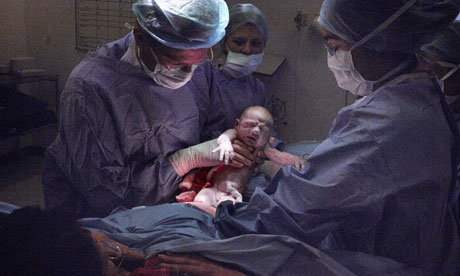
The medicalisation of life continues apace with new National Institute for Clinical Excellence (Nice) guidelines proposing caesarean section as, effectively, a lifestyle choice for all mothers, not just those who were only recently scorned as "too posh to push".
There is so much worryingly amiss with this that it's difficult to know where to start. From the point of view of medicine, the inherent risks of having an elective caesarean are becoming ever less of a concern – as long as you are only going to have two or three children. Have a larger family via major abdominal surgery and you risk rupture of the uterus and severe bleeding. Then there is the cost: some £800 over that of having your baby naturally, and this at a time when NHS services are being cut back so drastically.
Caesareans have been theoretically available for centuries but were usually carried out postmortem, after the mother had died and in order to save the child for baptism. Caesarean on a living mother, and only in extremis – to save both her and her child – was proposed in the 16th century by the French bishop François Rousset, but few if any survived it. A caesarean was a highly controversial procedure, the subject of much religious and ethical debate, never mind the extreme danger to life it presented before anaesthesia was introduced in the 1840s. Most surgeons and man-midwives thought it a work of cruelty, daringly innovative but horrendously dangerous. The innovative French were praised by one noted Victorian surgeon for their elegant journey to the final frontier of women's bodies.
The idea of rendering the life-saving caesarean a "lifestyle choice" and of going under the knife, instead of experiencing a natural birth, when there are no medical problems to be considered, also seems to smack of yet one more form of cosmetic surgery, one that guarantees no abdominal stretch marks. It is then, at the very least, the height of absurd vanity and, at most, an example of the ever-present gynophobia that permeates our society.
And yes, my first baby was born in traumatic circumstances, but I have never wished to have avoided his natural birth and, no, my body wasn't quite what it was before, but the tyranny of the celebrity-led, cultural ideal (see Victoria Beckham et al) of a sexually pert, compliant and fully-functioning girl-woman who is, in that awful phrase, always "honeymoon fresh", is despicable and creepingly pervasive.
The over-zealous medicalisation of normal life events turns risks into diseases and often means stigmatisation and an increase in the fear of and disgust with the idea of giving birth naturally. Childbirth has been thoroughly medicalised in western culture and this has determined the way we now think of, respond to and feel about it. This process began with the earliest medical attitudes to the female body – the principles of Greek and Roman medicine, its preconceptions of the "viler sex" as deformed males, formed the basis of medical knowledge in the west.
The choice is problematical, though. Should women shun medicalisation or should they demand even more medical attention for their particular needs? Should women aim to control their own bodies or seize an apparently greater power with the help of surgery – cosmetic or otherwise? As the eminent surgeon Sir Spencer Wells remarked in 1891, "Wonderful indeed, is woman's hydra-like tolerance of sections and mutilations."

